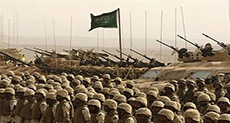A Year of Setbacks for Saudi Arabia: Retreat on all Fronts

Assafir, The Economist
Saudi Arabia had a bad 2016. Only in the second year of King Salman bin Abdul-Aziz Al Saud's rule and one year after the Saudi Deputy Crown Prince Mohammed bin Salman launched his "bold" economic policy, the kingdom is facing low oil prices, a deterioration in the domestic economic situation, in addition to sinking into the Yemen quagmire and a resurgent Iran. With the election of Donald Trump as the president of the United States, Riyadh faces a mysterious scenario with a new US administration unlike any of its predecessors. At the end of the year, the kingdom finds itself in retreat on all fronts.

In January this year Muhammad bin Salman, who in effect runs Saudi Arabia, declared an end to his country's "comatose" foreign policy and a determination to push back against Iran. The Syrian rebels he supported looked unbeatable in Aleppo. His generals spoke of the imminent capture of Sana'a, Yemen's capital, from the Houthis. He kept Iran and its ally, Hizbullah, from imposing their choice of president in Lebanon. Officials spoke of bankrupting Iran by saturating the market with oil, regardless of the wishes of OPEC partners.
Meanwhile, the Saudi ambassador Thamer Al-Sabhan, who went back to Baghdad for the first time in 25 years, has pulled out of Iraq, fleeing a torrent of abuse from Iraqi politicians who look towards Iran. Pounded by Iranian, Russian and Syrian government forces, the rebels in Aleppo are on the verge of defeat. The Saudis have bowed to Iran's preference for Lebanon's president. And at an OPEC meeting on November 30th, they agreed to shoulder the largest share of a production cut in a bid to restore prices, while letting Iran raise its production to pre-sanctions levels.
The OPEC agreement to reduce the cartel's oil exports is considered an "implicit defeat" for Saudi Arabia, according to Bruce Riedel, an American expert on US counter-terrorism who also served as an advisor to four US presidents on Middle East and Southeast Asian issues.
Riedel sees that the Saudis had resisted any cut in oil exports that did not include an Iranian cut as well. In the end, OPEC agreed Iran can increase exports while the kingdom must bear the bulk of reductions.
In Yemen, the British publication "The Economist" explained that Saudi Arabia's Houthi foes seem bent on denying Prince Muhammad a dignified exit, launching repeated cross-border raids and last week declaring their own new government, rather than agreeing to form one including the exiled president as the prince wants. It quoted an Iranian official saying, "Yemen will be Saudi Arabia's Vietnam. It is bleeding the Saudis' military and diplomatic prestige," adding that "If Saudi Arabia agrees to leave the rest of the region, Iran will let it keep Bahrain."
Meanwhile for Riedel, "the war in Yemen has also been a major cost for the kingdom. Saudi border towns have suffered from missile and rocket attacks. Rather than being able to cut defense spending - a key to Vision 2030 - it will have to rise to pay for the long-term costs of the war."
The article in "The Economist" points out that "this reversal of fortune owes much to the successes of Iran's military support for the Arab world's allied forces-Syria's President Bashar al-Assad, Iraq's army and paramilitary forces, and Lebanon's Hizbullah."
The magazine quoted General Ahmad Asiri, who advises the deputy crown prince on the Yemen campaign, as saying "They are surrounding us with militias."
It goes on to highlight that "Saudi Arabia is also losing soft power, cutting its funding to traditional Sunni allies, who have begun looking elsewhere." According to the magazine, with his construction firm in Saudi Arabia [Saudi Oger] in trouble because of government cuts, Saad Hariri has accepted the post of prime minister under Hizbullah's choice for president. Egypt's President, Abdel-Fattah al-Sisi, is making overtures to Syria, Russia and even Iran after Saudi Arabia cut back shipments of free oil.
With regard to the "JASTA" law that allows the families of the victims of the September 11 attacks to sue Saudi Arabia, Riedel says that it was a staggering setback for the kingdom's huge lobbying machine in Washington, warning at the same time that Donald Trump supported JASTA.
For his part, Adnan Tabatabai, the head of CARPO, a German think-tank which is running non-official talks between the Saudis and Iranians told "The Economist" that "Both countries [Saudi Arabia and Iran] are playing a waiting game."
The magazine also stressed that both countries fear Trump's impulsive action-even a senior Saudi prince has urged him not to break off the global deal that has limited Iran's nuclear program, adding that both seem uncertain whether he will tighten sanctions on Iran or ratchet up JASTA. It reaffirms that despite the influence of hardliners in both camps, "neither side wants anything resembling a direct war."
Comments
person Dr. K. B.
good luck
I hope both sides of the equation (Iran-Saudi Arabia) learn to understand each other better. Both side need to reduce capitalism and spend their money on education, health not on self-indulgences or 80 Boeing aircraft.



